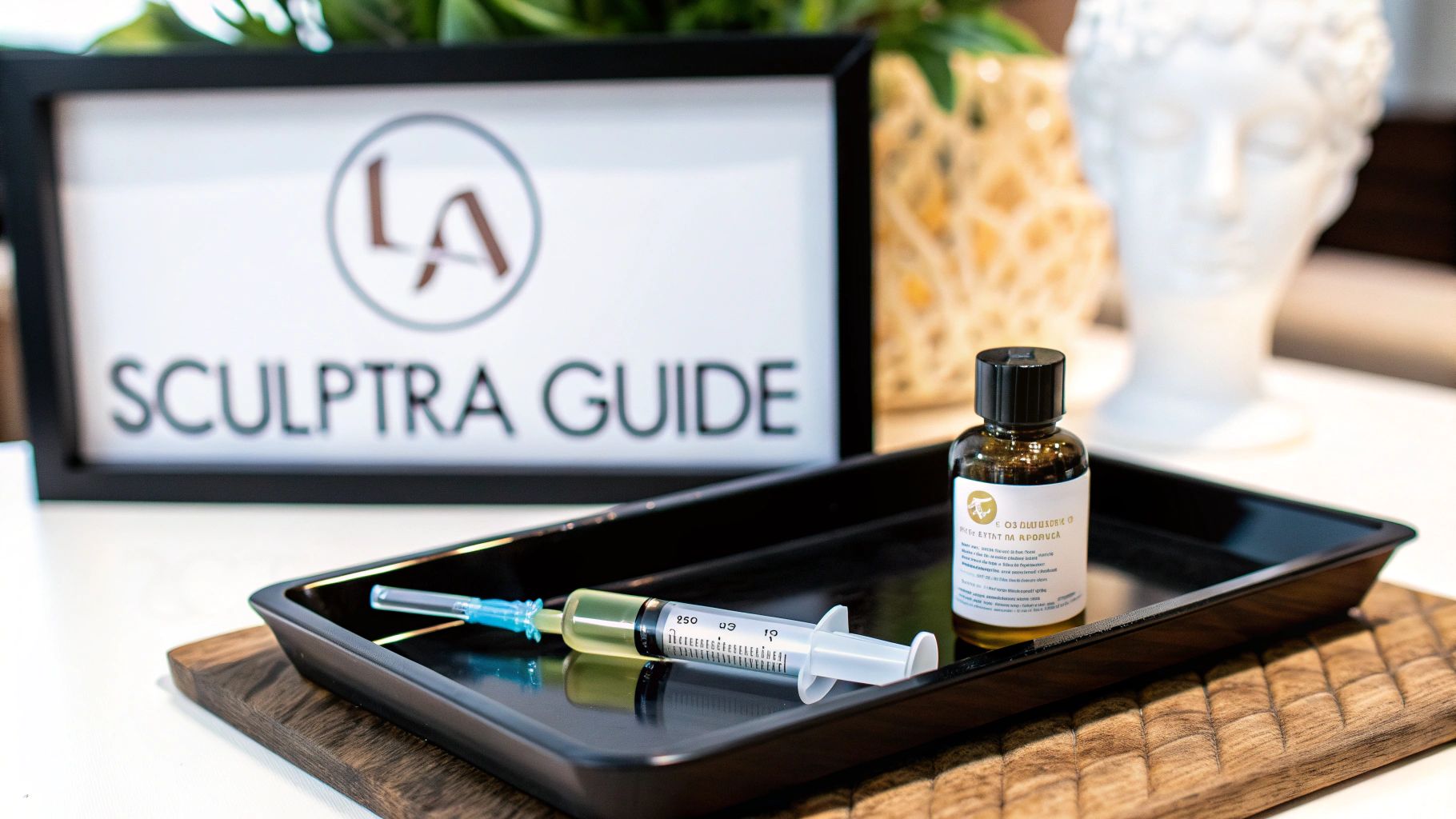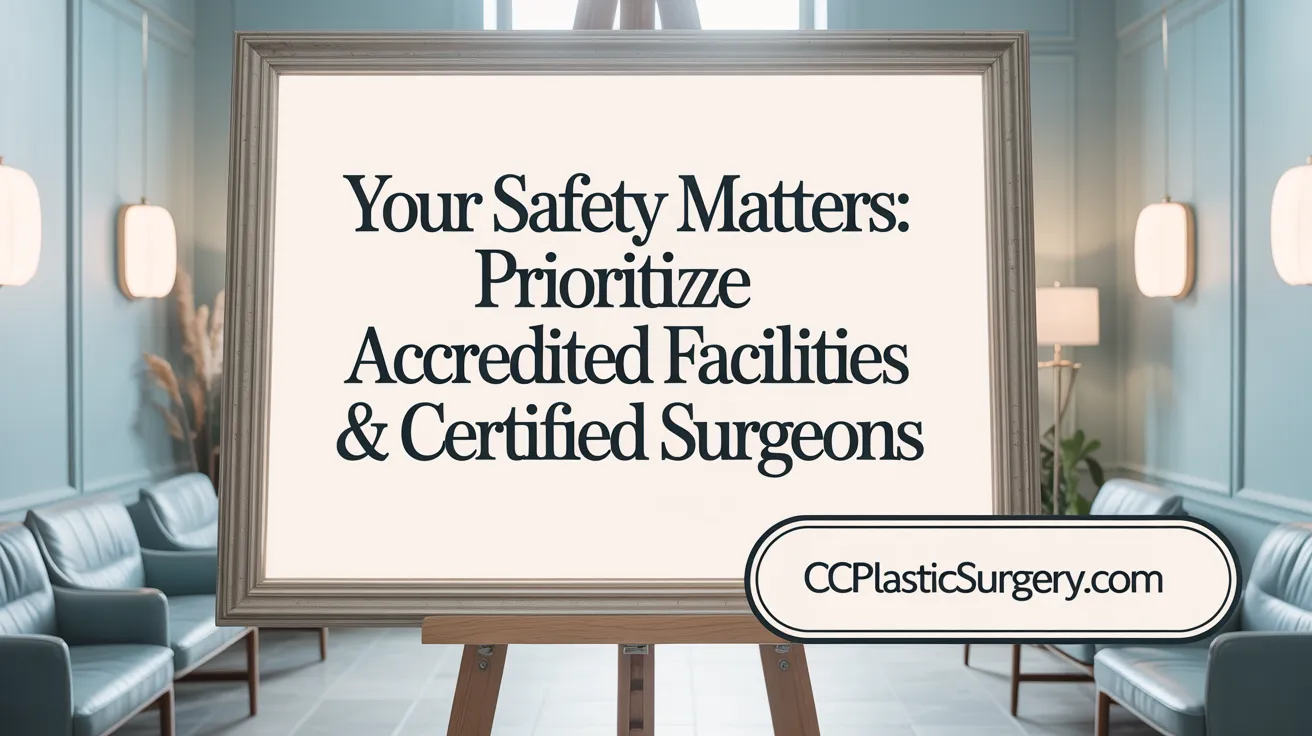
February 15, 2026
What Is Sculptra Treatment A Guide to Rebuilding Your Natural Collagen
What is Sculptra treatment? Explore how this unique collagen stimulator works to gradually restore facial volume for natural, long-lasting rejuvenation.
Nov 17, 2025

Accreditation and certification play a pivotal role in ensuring patient safety and quality care in plastic surgery. Accredited surgical facilities adhere to rigorous standards for safety, sanitation, equipment, and personnel qualifications, comparable to hospital-level care. This guarantees a controlled environment where emergency protocols and hygiene practices are strictly observed.
Facilities accredited by recognized bodies such as AAAHC, AAAASF, or the Joint Commission regularly undergo inspections to maintain high standards. Such oversight minimizes complications like infections and anesthesia risks, fostering safer surgical outcomes. Furthermore, accredited centers ensure privacy compliance, protecting sensitive patient information.
Surgeons certified by reputable boards, including the American Board of Plastic Surgery (ABPS) or the American Board of Cosmetic Surgery (ABCS), meet stringent education, training, and ethical benchmarks. They operate exclusively in accredited settings, combining expert skill with a safe facility environment. This partnership optimizes surgical results, enhances patient confidence, and reduces risks, making certification and accreditation fundamental pillars in cosmetic and reconstructive procedures.
Surgical facility accreditation is a formal recognition granted by respected organizations such as the AAAHC, The Joint Commission, and AAAASF. This certification confirms that a surgical center strictly complies with rigorous standards related to patient safety in surgical facilities, cleanliness and equipment standards, and personnel qualifications. Accreditation ensures that these facilities follow evidence-based protocols designed to optimize surgical outcomes and reduce risks. Additionally, accredited centers maintain compliance with privacy laws like HIPAA, protecting patients’ personal health information.
Accredited surgical facilities adhere to strict protocols before, during, and after procedures. This includes rigorous sanitation and sterilization standards at accredited surgical facilities, continuous maintenance of advanced and reliable medical equipment, and robust infection control measures equivalent to those in hospital environments. These practices significantly reduce the risk of infections and complications.
Emergency preparedness is a critical component of accreditation. Certified facilities maintain well-equipped operating rooms and have trained personnel ready to respond effectively to urgent situations. They implement detailed emergency procedures in accredited facilities and routinely train staff to manage complications safely.
Accreditation bodies conduct ongoing inspection and audit of surgical facilities to verify that quality and safety standards are consistently met. These evaluations ensure compliance with updated regulations and encourage continuous quality improvement initiatives. This commitment to oversight and improvement directly contributes to safer surgical care and better patient outcomes.
Protecting patients’ privacy is integral to accreditation. Facilities must comply with HIPAA and patient privacy regulations, ensuring all personal and medical information is securely handled and stored. This compliance safeguards patient confidentiality throughout the surgical process.
Choosing a surgical center with accreditation guarantees patients are receiving care in a setting rigorously vetted for importance of accreditation, patient safety, and professionalism. This is especially important for cosmetic and reconstructive surgeries where patient trust and surgical precision are paramount.

Board certification from recognized organizations such as the American Board of Plastic Surgery (ABPS) certification process, the Board Certified Cosmetic Surgeons (ABCS) certification process, and the American Board of Facial Plastic & Reconstructive Surgery Certification signals a surgeon's extensive training, expertise, and dedication to patient safety.
These certifications demonstrate that the surgeon has completed rigorous residency programs—typically a minimum of five to six years—including specialized fellowships focused on cosmetic or reconstructive surgery.
Certification also requires passing demanding written and oral examinations, verifying that the surgeon is proficient in both knowledge and practical skills. For example, ABCS-certified surgeons perform at least 300 cosmetic procedures and undergo comprehensive training focused exclusively on cosmetic surgery.
Certification boards enforce ongoing quality standards through multiple mechanisms:
Surgeons begin their education with medical school followed by residencies in general surgery or plastic surgery. Additional fellowships in cosmetic or facial plastic surgery refine their expertise for one to two years post-residency.
Continuing education is mandatory for maintaining certification, ensuring surgeons keep pace with evolving practices and maintain high ethical and safety standards.
Certified surgeons adhere to strict ethical codes that prioritize patient safety above all. Certification bodies mandate that surgeons practice within their expertise, follow evidence-based safety guidelines, and maintain transparent communication with patients to inform them of risks and benefits. These standards align with protocols used in accredited surgery centers to ensure quality and safety.
Studies and professional societies highlight that choosing certified surgeons results in better surgical outcomes, lower complication rates, and higher patient satisfaction. Certification assures patients that their surgeon is qualified, well-trained, and committed to ethical, high-quality care, which is crucial for safe and successful plastic surgery procedures.
By selecting a board-certified surgeon, patients gain confidence in receiving expert care performed in accredited surgical facilities that emphasize safety and personalized treatment.
Certified surgeons operating within accredited surgical centers ensure that procedures occur in environments adhering to rigorous Safety standards in surgical facilities, cleanliness, and emergency preparedness standards. Facilities accredited by recognized bodies—such as AAAHC, AAAASF, and The Joint Commission—maintain sterile, well-equipped operating rooms and employ qualified anesthesiologists, nurses, and support staff. This infrastructure supports the surgeon's expertise by minimizing risks related to infections, equipment failures, or inadequate emergency response, creating a safer surgical experience.
The combination of board-certified surgeons and accredited facilities forms a mutual reinforcement of high standards. Certification bodies like the American Board of Plastic Surgery (ABPS) certification process and the American Board of Cosmetic Surgery (ABCS) certification process require surgeons to perform procedures only in accredited centers for certification and re-certification. This ensures not only the surgeon's technical skill and ongoing education but also guarantees that the operating environment meets established benchmarks for safety and quality.
Clinical data and studies analyzed by accreditation organizations such as AAAASF certification in plastic surgery indicate that surgeries performed in accredited outpatient centers have complication and mortality rates equal to or lower than hospital-based procedures. By adhering to strict protocols and continuous quality improvement initiatives, these centers effectively reduce risks associated with anesthesia, infections, and surgical errors.
Accredited centers mandate that surgical teams consist of fully licensed and regularly trained professionals, including board-certified anesthesiologists, registered nurses, and licensed technicians. Their combined expertise in preoperative assessment, intraoperative monitoring, and postoperative care ensures comprehensive risk mitigation and patient safety. This is part of the personnel qualifications in accredited facilities and staff certification in accredited facilities.
Facilities and surgeons adhering to accreditation and certification standards commit to ongoing education and the adoption of advanced surgical techniques and safety measures. Updated anesthesia protocols, refined surgical approaches, strict infection control, and enhanced patient monitoring contribute to improved surgical outcomes and reduced recovery times, consistent with Patient Safety in Plastic Surgery and accredited surgical facility benefits.
Beyond technical safety, certified surgeons in accredited settings emphasize individualized patient assessment, considering medical history, aesthetic goals, and healing processes. This personalized approach, aligned with strict ethical standards and patient safety in facial plastic surgery, informs customized surgical plans that prioritize patient wellbeing and satisfaction, leading to naturally balanced and successful results.
| Factor | Role Detail | Impact on Outcomes |
|---|---|---|
| Surgeon Certification | Demonstrates expertise, ongoing education (see Board certification requirements for plastic surgeons | High-quality, safe surgical skills |
| Facility Accreditation | Ensures infrastructure, safety protocols (Surgical Facility Accreditation) | Minimizes risks, emergency readiness |
| Qualified Surgical Team | Skilled anesthesiologists, nurses (see Qualified surgical support staff) | Enhances perioperative safety |
| Modern Techniques & Protocols | Incorporation of advancements and guidelines (Patient safety in plastic surgery) | Reduces complications, improves recovery |
| Patient-Centered Planning | Individualized treatment and ethical focus (Ethical standards for certified plastic surgeons | Optimizes satisfaction and natural results |

Accredited surgical facilities maintain rigorous oversight through regular audits and extensive data reporting. These centers continuously track infection rates, complications, and other safety-related incidents to identify areas needing improvement. Quality improvement programs allow for the analysis of safety data collected from millions of procedures, supporting evidence-based refinements in protocols and standards and Continuous quality improvement in surgical facilities.
Facilities engage in thorough inspections by accrediting organizations to ensure compliance with evolving safety mandates and upgrade medical equipment and emergency preparedness measures accordingly. This constant vigilance helps maintain a high standard of patient safety and care quality comparable to hospital settings and is aligned with Safety standards in surgical facilities.
Patient education and transparent communication are fundamental to enhancing surgical safety. Comprehensive preoperative assessments guide personalized care plans, and detailed informed consent ensures patients understand all risks, benefits, and procedural details (Comprehensive preoperative assessment, Customized treatment plans, Detailed informed consent).
Open dialogue between surgeon and patient builds trust and encourages adherence to postoperative instructions, reducing the risk of complications. Ethical considerations mandate clear communication, prioritizing patient well-being over financial incentives (Ethical standards in surgery and are in line with Ethical standards for certified plastic surgeons.
Ongoing patient safety campaigns and educational resources by professional societies further raise awareness of surgeon qualifications and facility standards, empowering patients to make informed decisions about their care (Importance of accreditation and understanding Board certification requirements for plastic surgeons.
These combined elements of continuous monitoring, quality improvement, and patient-centered communication foster a culture of safety vital to successful plastic surgery outcomes.

Undergoing plastic surgery in non-accredited facilities or with uncertified surgeons can pose serious risks. Facilities without accreditation may not uphold strict sanitation protocols or maintain properly sterilized equipment, leading to higher chances of infections and complications. They might lack emergency preparedness and qualified medical personnel, which are critical for managing intraoperative and postoperative issues safely.
Surgeons who are not board-certified may not have completed the rigorous training and examinations required to master cosmetic or reconstructive procedures. This increases the risk of poor aesthetic outcomes, unintended injuries, and compromised patient safety.
Patients should actively verify the credentials of both the surgical facility and their chosen surgeon. Accreditation status can be confirmed through the official websites of recognized organizations such as the American Association for Accreditation of Ambulatory Surgery Facilities (AAAASF), the Accreditation Association for Ambulatory Health Care (AAAHC), and The Joint Commission.
For surgeon certification, tools like the ['Find a Surgeon' directories hosted by the American Board of Plastic Surgery (ABPS)] or the American Board of Cosmetic Surgery (ABCS) provide reliable verification of qualifications and board status.
Certified plastic surgeons comply with strict ethical codes and legal standards, including ongoing education, peer reviews, and adherence to patient safety protocols. They are subject to monitoring for professional conduct and competency, which reduces risks related to malpractice or unethical practices. See ethical practice and patient safety standards and patient safety in plastic surgery for more details.
Facilities like Schaffer Plastic Surgery and surgeons practicing in Hyannis and Boston maintain accreditation by nationally recognized organizations, ensuring they meet high safety and quality standards. Their proximity to major medical centers, strict protocols, and personalized care further enhance patient confidence. Learn more about surgical facility accreditation in Hyannis Massachusetts and the benefits of seeing a plastic surgeon in Boston.
Prioritizing surgical facility accreditation alongside surgeon board certification safeguards patient well-being, optimizes surgical outcomes, and ensures ethical, compliant care within trusted environments.
Choosing a surgeon and surgical facility that meet recognized accreditation standards is essential for your safety and satisfaction. Accredited facilities comply with rigorous safety, cleanliness, equipment, and emergency preparedness protocols, often matching hospital-grade requirements. Certification of surgeons—such as through the American Board of Cosmetic Surgery (ABCS) or American Board of Plastic Surgery (ABPS)—ensures specialized training and demonstrates expertise verified through strict exams and ongoing education.
When selecting a provider, prioritize surgeons who operate exclusively in accredited centers. Institutions accredited by bodies like AAAASF, AAAHC, or The Joint Commission rigorously monitor staff qualifications and patient safety. Such oversight reduces risks of complications, infections, and ensures adherence to privacy laws like HIPAA. Facilities with accreditation foster increased confidence by maintaining up-to-date equipment and protocols.
Board-certified surgeons engage in extensive residency and fellowship training, perform numerous procedures, and commit to continuous professional development. This ongoing improvement directly translates to safer, more natural results tailored to each patient's unique needs.
Accreditation and certification are not merely administrative; they reflect personalized, ethical, and patient-focused care. By choosing qualified surgeons within accredited facilities, patients receive attentive, customized treatment plans, fostering trust and improving surgical outcomes with peace of mind.

February 15, 2026
What is Sculptra treatment? Explore how this unique collagen stimulator works to gradually restore facial volume for natural, long-lasting rejuvenation.

February 14, 2026
Learn how to tighten facial skin naturally with proven skincare, exercises, and diet. Our guide offers actionable tips for achieving firmer, more youthful skin.

February 13, 2026
Considering Kybella for under chin fat? Learn how it works, what to expect, costs, and if you're a candidate in our complete guide to jawline contouring.